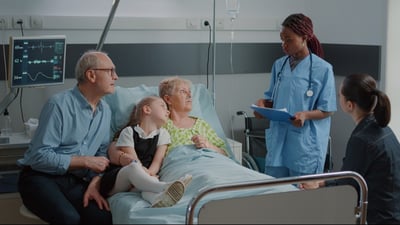Ovarian Cancer



Relevance: Medium-High
Most relevant for: People with an inherited mutation that increases cancer risk who are interested in sexual health
Study: Impact on sexual well-being among people with an inherited BRCA mutation
This study looked at sexual well-being in those with an inherited BRCA1 or BRCA2 mutation. Knowledge about having an inherited BRCA1 or BRCA1 mutation did not influence sexual health. However, menopause and cancer diagnosis was had a significant impact on sexual health and sexual function. (Posted 2/13/25)
Este artículo está disponible en español.
READ MORE ›


Relevance: Medium-High
Most relevant for: People with a BRCA1 or BRCA2 mutation who have had risk-reducing surgery to remove their ovaries
Study: Risk of peritoneal cancer is low for people with an inherited BRCA mutation after surgery
The risk of peritoneal cancer is low in people with an inherited BRCA1 or BRCA2 mutation after risk-reducing ovary removal (oophorectomy). The risk was even lower when risk-reducing surgery was done at a young age and after 2005 when removal of the fallopian tubes was included in the procedure. The findings of this research support the theory that like ovarian cancer, peritoneal cancer begins in the fallopian tubes and reinforces the age recommendation for surgery. (Posted 1/23/25)
Este artículo está disponible en español.
READ MORE ›


Relevance: Medium-High
Most relevant for: People at high risk for hereditary cancer
Guideline: Hereditary cancer gene guidelines expand
The National Comprehensive Cancer Network regularly updates guidelines for several types of hereditary cancer. These recommendations often change when new research is published. Recently, the NCCN expanded its guidelines to include information on hereditary prostate and gastric cancers. (Posted 1/6/25)
Este artículo está disponible en español.
READ MORE ›


Relevance: Medium-High
Most relevant for: People with cancer interested in using cannabis to help manage symptoms.
Study: Use of cannabis for cancer symptom management
Among people with cancer, interest in the use of cannabis to manage cancer symptoms and treatment side effects is high. The world's leading professional organization of oncologists has published strategies to help adults with cancer and their healthcare providers have open, nonjudgmental discussions about the use of cannabis to manage cancer symptoms. (Posted 9/27/24)
Este artículo está disponible en español.
READ MORE ›


Relevance: High
Most relevant for: People diagnosed with cancer
Topic: Acupressure for cancer symptom relief
Acupressure is a safe treatment that can be used to relieve some symptoms of cancer and side effects of treatment. Light pressure applied to key points on the body may help with fatigue, sleep, nausea and possibly other symptoms as well. (Posted 8/1/24)
Este artículo está disponible en español.
READ MORE ›


Relevance: Medium-High
Most relevant for: People with advanced HER2-positive cancer
Topic: The drug Enhertu is FDA-approved for any advanced or metastatic HER2-positive tumors
The FDA granted accelerated approval of Enhertu for people with any HER2-positive tumor that is metastatic or cannot be surgically removed. Eligible patients must have had previous treatment such as chemotherapy or hormone therapy. (Posted 7/19/24)
Este artículo está disponible en español.
READ MORE ›


Relevance: Medium-High
Most relevant for: Cancer patients
Topic: Experts call for early palliative care for cancer patients
People with cancer need support and care not only at the end of life but from the time of diagnosis. At the 2024 American Society of Clinical Oncology (ASCO) annual meeting, the organization’s president urged cancer healthcare professionals to make palliative care central to cancer treatment. (Posted 7/17/24)
Este artículo está disponible en español.
READ MORE ›


Relevance: Medium-High
Most relevant for: People with ovarian cancer.
Update: News from the FDA: New ovarian cancer treatment and imaging drug
The FDA recently approved a new treatment for some people with ovarian cancer. The FDA also approved a new imaging drug that can help surgeons find and remove ovarian cancer. (Posted 5/30/24)
Este artículo está disponible en español.
READ MORE ›


Relevance: High
Most relevant for: People who have had a risk reducing bilateral oophorectomy
Study: Ovary removal reduces risk of death from any cause in people with BRCA mutations
People who test positive for an inherited BRCA1 or BRCA2 mutation can reduce their risk of ovarian cancer by having both ovaries and fallopian tubes removed. A study published in 2024 found an added benefit of this surgery – a lower risk of death from any cause by age 75. (Posted 5/23/24)
Este artículo está disponible en español.
READ MORE ›


Relevance: High
Most relevant for: People diagnosed with cancer who have not yet had genetic testing
Study: Genetic testing among people with cancer can find mutations that may affect treatment and prevention
Despite national guidelines recommending genetic testing, less than 10 percent of eligible patients had genetic testing within two years after their cancer diagnosis. Among those who had testing, 10-30 percent had an inherited mutation that could affect their medical care. (Posted 3/15/2024)
Este artículo está disponible en español.
READ MORE ›